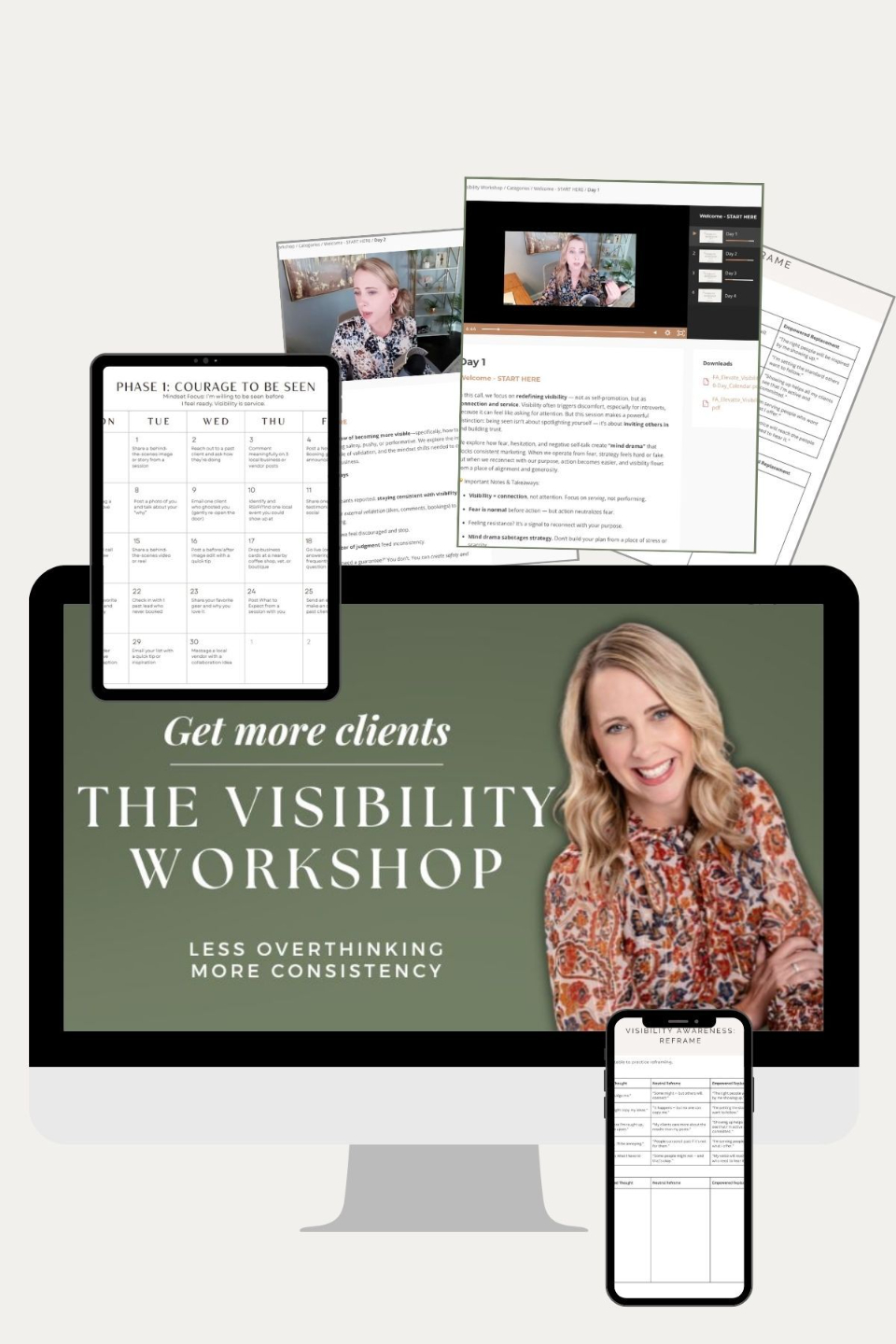Podcast Ep 384 - If No One Knows You Exist, They Can’t Hire You

Feeling stuck in a spiral of overthinking or overwhelm? In this episode, Heather Lahtinen breaks down why it’s not your to-do list that’s overwhelming you—it’s your thoughts. Learn how self-trust, not control, is the antidote to overthinking and why shifting your mindset can help you finally move forward with clarity and confidence.
Heather also shares insights from the recent 4 Clients in 4 Weeks Challenge and introduces the upcoming Visibility Workshop inside Elevate—a space designed to help photographers step into their next level of growth with courage and simplicity.
👉 Listen in to discover how to trade overwhelm for self-trust and overthinking for intentional action.
How to Support the Podcast:
- Subscribe to the podcast on iTunes or wherever you listen to podcasts. Please like, share, and leave a review.
- If you like the content, please share with your friends by posting on social media so that we can reach and impact more people.
Join our next free coaching workshop: www.getcoachedbyheather.com
Connect:
Heather Lahtinen: Website, Facebook, Instagram
TRANSCRIPT
You're listening to the Flourish Academy podcast, and today we are talking about
overwhelm and overthinking. My name is Heather Lottinen. I'm a photographer,
educator, and entrepreneur, and I founded the Flourish Academy as a resource for
photographers of all levels. We want to help you pursue your passion on your own
terms because we believe there is room for everyone. In this podcast, we focus on
creating breakthroughs with your mindset to discover the things that are really
holding you back in business and life. A few weeks ago, we wrapped up the four
clients in four weeks challenge. And one thing I noticed as I worked with my
photographer friend is that making themselves or their business visible can be a
challenge. And that's largely due to the way we think about being visible.
In fact, I asked our elevators what their thoughts were around being visible and
they said things like, I want to work with more clients. I want more clients, but
I'm afraid to post because people might judge and they might not like my work.
They might think that I'm annoying. Another person said, well, what if I screw up?
Then people will laugh at me and say, well, we knew she was going to screw up.
And then people who were counting on me would be disappointed. Another person said,
I want to be seen, but I don't want to be seen. And what if I put my work and
myself out there? I become visible and people don't like what they see. And then
what happens if I start getting bookings and I disappoint people? So There's this
interesting fear of failure and then fear of success.
It's like, what if I put myself out there and they don't book me, then I will
feel like I'm failing. I'll feel rejected. Or if they do book me, how am I going
to manage all of those clients? And what if I disappoint them? As a result of all
of these thoughts I was hearing, I decided to create the visibility workshop so that
we can work together on the thoughts and strategies needed to improve your
visibility. People can't hire you if they don't know that you exist. So this
workshop will take place at the end of October and is only available inside of
Elevate. When I observe or notice a problem that you are having,
I take immediate action to create a resource to solve that problem.
My only job is to help you grow your business by solving your challenges.
Speaking of which, there are two ways that you can work with me, either inside of
our elevate program or through one -on -one coaching. I only accept a limited number
of one -on -one clients just due to my schedule, but I do currently have one spot
open. And did you know that you get Elevate for free when you work with me one -on
-one? You actually get everything for free. I like to treat my one -on -one clients
really well. And for example, we have the upcoming 2026 mastermind in January and
that's included with one -on -one coaching. Both of the links are in those show
notes, but if you want to learn about the visibility challenge, go to flourish. Dot
Academy slash elevate because I have all that information there. Today we are talking
about overwhelm and overthinking. Everything I teach,
I try to keep it really simple because I know that photographers tend to feel
overwhelmed, and I want to help prevent that, but to be honest, I know that to
some degree, we all feel overwhelmed at some point. But I don't think you're
overwhelmed. Well, not in the way that you think you are. You're not overwhelmed by
your circumstances or by everything that you have to do. You are overwhelmed by your
thoughts. Because if you weren't thinking, if you weren't capable of having thoughts,
then you wouldn't be overwhelmed. And if you were to work with me and you thought,
Heather makes everything simple, and I have a resource, both with her and with the
other photographers in Elevate, or you thought, this is easier than I think, I have
those resources. If those were your thoughts, you would not feel overwhelmed. And
anyway, your only job, if you were to narrow it down, your only job is to get
paying clients in front of your lens and also not to quit. Because if you decide
that you're just going to
that you are choosing that. I believe that that is just the brain's default way of
processing. So you are definitely not choosing it in that moment. But once you
become aware that you are overwhelmed and, and you can see that it's because of
your thinking, that's where you have a choice. But it does take some time and
practice to get to this point. So when overwhelm just happens to you, I don't think
you are choosing it in that moment. I've talked about overwhelm a lot and various
calls and on the podcast. Today, I want to focus a little bit more on overthinking.
This is the AI view of overthinking. It is thinking about something excessively or
too much to the point that it becomes unproductive and causes stress. It often
involves constantly analyzing a situation, replaying conversations,
worrying about future scenarios, and focusing on negative thoughts or worst case
outcomes. This can lead to anxiety and even physical symptoms like headaches or
fatigue. Here's what overthinking looks like. Rumination. Again,
replaying past events or conversations over and over in focusing on perceived mistakes
or regrets. Worrying, constantly focusing on potential negative outcomes that haven't
even happened yet. Overanalysis, spending excessive time trying to find meanings or
scrutinizing every detail of a situation, catastrophizing, assuming the worst case
scenario will happen even if the likelihood is low. And of course,
again, this affects you with mental and emotional distress, could include physical
symptoms like headaches, muscle tension, fatigue, could lead to social and professional
struggles. It could hinder productivity, worsened decision -making, and cause social
withdrawal due to fear or judgment of misunderstanding. So that's AI's version.
And AI also had a way to manage overthinking. And when I read it,
I was like, oh, okay, my approach is different. But I'm going to share the AI
version because it might be useful for you. It said to challenge those negative
thoughts. Become aware of your negative thought patterns and challenge them in a non
-judgmental way. I agree with that. Problem solve. Take action on situations that can
be influenced, writing down a few actions you can take to help you feel more in
control and then distract yourself. Engage in activities like exercise,
spending time with friends, or a hobby to shift your focus and disrupt the cycle of
repetitive thoughts. Okay, I definitely think that those are helpful. I think my
approach is a little more straightforward. But before I get to that, I wondered why
we feel the need to overthink. So for one,
I think it can be about controlling anxiety because for some people, overthinking can
be a way of trying to control a situation and to feel more confident about what to
do next. When you're overthinking, the brain attempts to reduce your anxiety by
thinking through every possible scenario so that it can predict what will happen.
But then, of course, you often get stuck in this mode and you have trouble moving
on or moving forward and taking action. Because then your brain, your brain's always
going to come up with another scenario. And this obviously causes more trouble in
the long run. And my anecdote to this is I trust myself to handle anything that
comes up as a result of the decision I make. So I lean to self -trust, rather than
trying to predict outcomes, I just trust myself to figure out when it happens.
And then, of course, we have perfectionism. And as one might expect, perfectionists
are more likely to ruminate than others, because we, us perfectionists,
we set high standards for ourselves. So we have the tendency to overthink because of
the fear of failing because, I mean, naturally, it has to be perfect because we
think that we cannot handle failure. So my anecdote, I trust myself to manage my
emotion, any emotion that comes up when something doesn't work, thereby releasing the
need for it to be perfect. And lastly, There's, I think, the regular baseline
indecisiveness. And thinking through the pros and cons of any decision is helpful in
many cases, but it can turn into overthinking if you repeatedly go over your options
and you don't get any closer to making a decision. So my anecdote,
I trust myself to manage the consequences of any decision that I make. And if the
decision is reversible, and most of them are, then just pick one and move forward.
I also ask myself, am I overthinking about this because I believe there is a right
or wrong way? But what if there wasn't? What if any choice I make,
any decision you make, what if it's a good one? I hope that you picked up, you
probably did pick up on the common theme here. It is self -trust,
belief in oneself, the confidence to know that you can figure it out.
It's like, I'm feeling overwhelmed. Okay, that's interesting. Where am I doubting my
capabilities? I'm overthinking. Okay, that's interesting.
where am I not trusting myself? So these two questions,
where am I doubting my capabilities, where am I not trusting myself? These are great
questions to think about when you are in overwhelm or you are overthinking.
But if these questions, maybe you feel like your capacity to answer them is limited.
I just, I don't know. I just can't even think about it because I'm so turned
upside down. That's fair. Then just start repeating to yourself, I am capable.
I trust myself. Both of those things are true. And if you remind yourself often,
it will help you move forward faster. I would love for you to join us inside of
Elevate for the Visibility Workshop. Make sure you head over to Flourish .d Academy
slash Elevate to learn more. I hope that you found this useful. I'll see you in
the next episode.






